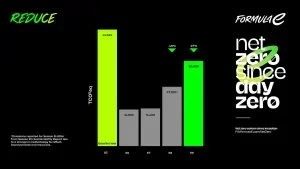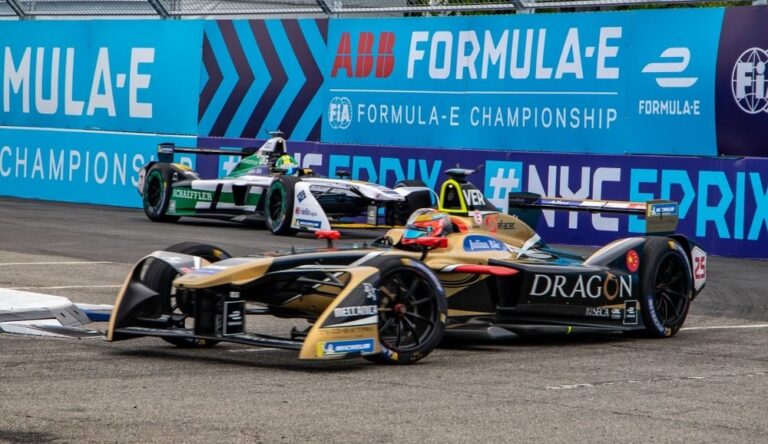Formula E champion and ABT CUPRA driver Lucas di Grassi teamed up with Rubicon Carbon, a leading carbon credit management company, to offset his carbon footprint. This partnership marks Di Grassi as the first Formula E driver to invest in carbon credits to tackle his emissions.
Di Grassi switches to carbon compensation
The rapid growth of motorsport has raised environmental concerns, such as high CO2 emissions. Initially limited, the industry’s sustainable practices now focus on reducing emissions, conserving energy and using renewable sources to tackle climate change and promote greener racing.
Formula E shows how a complex, global motorsport industry must race to reach net zero emissions. The organization’s champion, di Grassi, made the first foray into sustainable racing.
Known for his activism in mobility technology, Lucas di Grassi has become a leading figure in advocating for environmental responsibility within the racing industry. He has publicly distanced himself from industries that do not prioritize sustainability. He is the first driver to offset all his CO2 emissions from traveling around the world, starting with his first Formula E race in China.

Di Grassi has created a Rubicon Carbon Tonne (RCT) portfolio, a diversified and actively managed collection of carbon credits. This portfolio includes several projects for carbon removal, nature-based avoidance and industrial avoidance. The RCTs are intended to reduce risk and provide price certainty to buyers, thereby increasing their options for carbon offsets.
Di Grassi said of his collaboration with Rubicon:
“In line with the values and objectives of Formula E, I drive an electric car and have adjusted my lifestyle. Yet credible carbon avoidance and removal is the only way to play the sport we love while being responsible for our environment. I would be very happy if many other athletes, not only in Formula E, would consider the same path.”
Zero-Emission Race: Formula E’s sustainability revolution
Their collaboration illustrates how sports partnerships can drive positive environmental change and raise awareness of sustainability. Tom Montag, CEO of Rubicon Carbon, expressed his excitement about the partnership, saying:
“We are excited to support Lucas and Formula E, who share our values in building a low-carbon future.”
Working with personalities like di Grassi is part of Rubicon’s broader strategy to invest in carbon projects worldwide. Recent initiatives include a large-scale ecosystem restoration project in Panama in partnership with Ponterra, Microsoft and Carbon Streaming. It is a 250,000 hectare restoration project in South Africa led by Imperative, and a partnership with YvY Capital to scale up carbon investments in Brazil.
Rubicon Carbon’s commitment to sustainability and innovation is reflected in its efforts to create impactful environmental solutions. By working with influential figures like Lucas di Grassi, Rubicon aims to drive wider adoption of carbon offset practices within the sports industry and beyond.
Leading the way in Net Zero Carbon Racing
With seven days to go before the 2024 Hankook London E-Prix starts, this milestone once again underlines Formula E’s environmental commitment.
Motorsport’s carbon footprint mainly comes from transporting teams and vehicles worldwide and the emissions from fans traveling to races. Formula E tackles this by logically planning races worldwide, reducing unnecessary travel.
In the 2022-2023 season, Formula E implemented the ABB Ability OPTIMAX system to monitor race-specific energy consumption and thus improve efficiency. Despite these efforts, freight still represents ¾ of the sport’s carbon footprint.
- The championship offsets between 35,000 and 40,000 tonnes of CO2 equivalent annually, with the aim of reducing the carbon footprint by 45% by 2030 compared to the 2018 baseline. Impressively, a 25% reduction has already been achieved.
In collaboration with partners such as DHL, Formula E investigates sustainable aviation fuels and integrates sustainability throughout the supply chain. Initiatives include recycling tires and using recycled materials for vehicle chassis. Ultimately, the sports organization’s mission is to show how auto racing can thrive without emissions.
Formula E is the first sport to have a certified net zero carbon footprint since its inception. The organization manages its environmental footprint through a three-step process: Measure, reduce and compensate.
-
Measuring unit
Formula E carefully measures CO2 emissions throughout the championship. Since the first season, the organization has been working with experts in the field of carbon footprint to conduct a life cycle analysis model. This model evaluates all racing activities and Formula E headquarters, allowing annual monitoring and calculation of greenhouse gas emissions.


The emissions of the motorsport organization are divided into:
- Scope 1: Direct emissions (1.3%)
- Scope 2: Indirect emissions due to energy consumption (0.7%)
- Scope 3: Other indirect emissions, including travel, freight transport and car production (98%)
-
Reduce
The world’s first all-electric FIA World Championship is prioritizing its reduction CO2 footprint through direct actions. In 2021, motorsport set emission reduction targets validated by the Science Based Targets initiative (SBTi). The objectives include a 60% reduction of Scope 1 and Scope 2 emissions and 27.5% reducing Scope 3 emissions by 2030, compared to the 2019 baseline. These targets aim to limit temperature increase to 1.5°C.


Key initiatives to reduce emissions include working with logistics providers to use biofuels for road and maritime transport, tackling the largest source of emissions in the championship.
-
Offset
To tackle unavoidable emissions, Formula E is investing in sustainable energy projects in racing markets. In Season 6, these investments offset all emissions since the sport’s inception, making it the first motorsport to achieve carbon neutral status.
Formula E offset an estimated 33,800 tCO2e for Season 8 by purchasing and withdrawing 33,800 certified emissions reductions from two projects in Mexico.
In Season 9, electric motorsport strengthened its commitment by joining PAS 2060, the international specification for demonstrating carbon neutrality, becoming the first global sports organization to do so.
Formula E’s pioneering efforts to measure, reduce and offset carbon emissions illustrate how even high-impact sports can lead to sustainability. By achieving and maintaining carbon neutral status, Formula E sets a benchmark for other industries to follow in the quest for a greener future.


